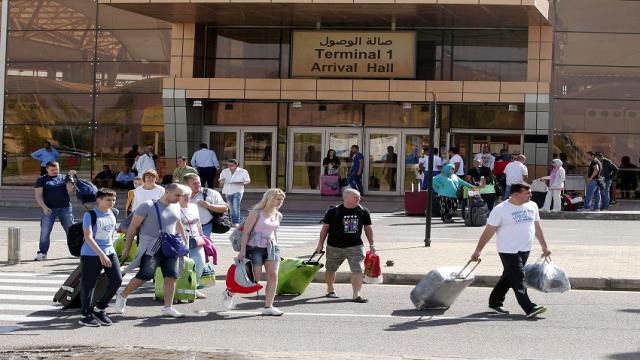The first batch of British tourists has landed in Sharm el-Sheikh, the much-liked travel destination. britain suspended flights to this Egyptian resort town in November 2015 because of a terrorist attack. It involved the bombing of a Russian airliner soon after takeoff and left no survivors. There were 224 people on board. That led Britain to impose restrictions on flights to the tourist spot. Those who wanted to go there had to follow alternate routes. The authorities lifted the restrictions in October in view of Egypt improving its security procedures.
Consequently, a flight by TUI, the UK’s biggest travel company took off from Gatwick and landed in the Egyptian resort town. The airline announced last year that it would resume flights this month. It has kept its word and tourists are happy.
British tourists land in Sharm el-Sheikh on first flights since 2015 plane bombing https://t.co/smTKFlLaOs
— The Guardian (@guardian) February 17, 2020
The Guardian says the TUI flight received a rousing welcome and local dignitaries graced the occasion. It was a celebration of sorts with flowers, music, and cocktails. TUI was the first major travel company that indicated their willingness to resume. The ban inconvenienced innumerable British tourists who come to the Red Sea destination every year.
They can heave a sigh of relief and make plans to enjoy their holidays.
Other options for tourists
Apart from TUI, there are other options for tourists to reach the destination. One of these is EasyJet. The company mentioned in January about restarting flights from Manchester beginning June 7. There will also be flights from Gatwick but that could be would be later. The tentative date for that is 30 September. Even the small firms and travel agents are excited about getting Sharm el-Sheikh back on their maps. It's a paradise for tourists and foreigners flock there in thousands. However, the travel ban has hit the tourism industry hard.
British tourists arriving on one of the first flights from the UK to #Egypt's Sharm El-Sheikh were greeted with celebrations after restrictions following a 2015 airline terror attack were lifted. https://t.co/eAgoOdPZCZ
— The New Arab (@The_NewArab) February 17, 2020The Guardian provides information about the attack that killed all 224 onboard the plane.
It was the Metrojet flight 9628 and the dead included a large number of Russian holidaymakers. At that time, there were thousands of foreigners in the resort. The authorities had to arrange for their journey back home on priority. Subsequently, Germany lifted its flight ban. Britain continued with restrictions on travel to Sharm el-Sheikh while allowing flights to other Egyptian airports. Obviously, it resulted in a steep decline in visitors from the UK. Of course, some were determined to go and they had to follow alternative routes.
Sharm el-Sheikh on the itinerary of tourists to Egypt
According to Sky News, the UK banned flights to Sharm el-Sheikh following a bomb blast in 2015 that blew up a Russian airliner soon after take-off from the airport.
There were 224 people on board the aircraft and none survived. It led to the repatriation of about 16,000 tourists because experts felt the security procedures at the airport fell in the category of high risk. Keeping the safety aspect of travelers in mind, Britain imposed a ban on travel to the Egyptian resort town. That has, since, been lifted and the TUI flight from Gatwick was one of the first from the UK to land after restrictions were withdrawn.
Tourists want safety
Tourists want to share in the new lifestyle of a foreign country, taste its culinary delights, enjoy its culture and visit exotic places but, above all, they want safety. No one would like to fall victim to any terror attack.
When such an incident occurs, there is a decline in the arrival of tourists and corresponding loss for the tourism sector. That is what happened in Sharm el-Sheikh. That phase appears to be over. Of course, climatic disorders can also affect tourism. In Venice, the arrival of tourists dropped because of floods. It worried hoteliers because reservations plummeted. New Zealand also faced difficulties when floods left hundreds of tourists stranded.
![Amazing Sharm El-Sheikh beach and tourists. [Image source/settime2588 YouTube video] Amazing Sharm El-Sheikh beach and tourists. [Image source/settime2588 YouTube video]](https://staticr1.blastingcdncf.com/media/photogallery/2020/2/17/660x290/b_502x220x82/amazing-sharm-el-sheikh-beach-and-tourists-image-sourcesettime2588-youtube-video_2402931.jpg)



